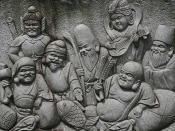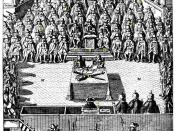During 1647-1650 the countrymen of England had been completely astonished. The people had seen their King challenged and beaten in war and court resulting in his execution. Groups were also developing (political factions) wanting to see their political goals achieved.
Charles had lost the first civil war but was encouraged spiritually to never give up. This loss he believed was in fact a punishment by
God for allowing the death of Strafford so any further concessions would lead inevitably to further punishments. Charles rather like Cromwell in some respects also believed that God was on his side by this time whereas with Cromwell he had based this notion and belief on the fact that he had won the first war. when Cromwell agreed to try and settle the dispute with Charles, Charles refused and form of peace and had allied with the Royalists and Scots. The King had lost once again though and this had further enraged Cromwell due to the fact Charles was willing to allow Scottish Presbyterianism to be imposed in England if he won.
Cromwell and his other generals were now deciding what to do with this supposed tyrant. Along with this the public were also questioning who is really in charge here? A further negotiation plan was attempted however the issue of trust was once again broken as Charles was only agreeing to the concessions in the talks so he could get free. Some of the concessions would have been Parliament having control over the Militia for the next 10 years and Pariament could have power to appoint great officers. Things had turned from bad to worst on 6th December 1648 as Colonel Pride has arrested 45 MPS at Westminster and turned others back leaving the remainding members then on to be called the Rump.
By 28th December the Rump passed an ordinance for the trial of the king, they believed his presence was unhealthy for the progression and personal wellbeing of England. To bring the King to court Parliament did have to challengemoral and legal technicalities. They were aware that the King owned and consented to courts therefore the judges would be likely to not find him guilty by way of a bias decision. Who could blame them then this was done in Star Chamber previously to Laud's opponents. The Rump therefore setup the High Court of Justice, however they could not promise a fair trial. When Charle's did attend court he continually argued that his trial and court defys the whole principle of the rule of Law. When it came to signing the petition of Charles death many M.P.'S started to feel scared because of the possible knock on effects later. This hesitation however was overcome and Charles was sentenced to death,clealr illsutrating a world turning upside down.
During this period of time there were many religious and political parties developing. The Ranters were one of whom who were known as extremists being incredibly anti religious. They infact did not believe in life after deat or heaven or hell. Instead there policies were enjoying life and raising issues of anarchy and hedonism.
The Fifth Monarchists emerged around 1650. This particular group were made up of lower middle classes who focussed particularly on the millenium. They had believed there should be no power substituting the power of God and had looked to abolish taxation such as tithes which were introduced by Laud. In addition they believed that the English Common law was issuing harsher
punishments for less harsher crimes for instance the death penalty sould be given for the criminal offence of theft. Furhtermore punishments to property owners was also too sevre. Cromwell sympathized with their millenarian prophecies but otherwise saw them as subversive because they challenged the power of the gentry.
The Muggletonians were the most imaginative in terms of developing new concepts of religion. They believed that EVE and the Devilwere Cain's parents. Whereas Ablesparents were EVE and God. Through doing this Muggleton created a crazy confusion of their identities. Muggleton also believed that he was one of the two messengers told in the Book of Revelation and God gave him the power to decide who would be saved and who would die.
During the 1650's the Quakers group had began. The Quaker's based their authority on revelation and were considered the most subversive by the Gentlemen. For instance even when it came to minor issues such addressing the J.P's as worshipful they would refuse, believing on th ebasis they should worship no other but God. They had also rejected the doctrine of a formal ministry and organised their own meeting of worship without formal service. Furthermore they had denied and abandones many of the ideas of social order for example not taking off their hats in the presence of anyone.
The Independents were another group who supposedly all in favour of toleration. Yet however in their statements their toleration clearly lyes with given boundaries such as tolerating Papists, Prelatists, Quakers and Ranters. With the Independents not accepting the National Church they had abandones many of the ecclesiastical arguments for persecution enabling them to be more argumentative than the Presbytarians on religious liberty. They did not totally disregard all apsects of religious unity. Firstly they believed thje divine right could be used as a last resort for kings/Queens seeking obedience and doctrines which speak totally against it should be banned. The Independents had also believed that when the state knows somthing is wrong they still support or tolerate it. So the Independents could clearly see the need for law and order for instance with Catholics and the Ranters.
The Levellers were another group alot more advanced in their ideas of social reform. It was made up of middle class revolutionaries with a Marx perspective. They believed the existing ruling class, existing law and property structure was imposed by William the Conqueror. Therefore these allocations,of power and priviledges were by a form of force. The Levellers also wanted to abolish the House of Lords and Monarchy and turn England into a republic. They also wanted to ease taxes for the poor and succeed in the abolition of tithes.
Puritanism was clearly an excuse for challengingthe ways things were done in the past. However the Gentry by now had fought and for the same rights but now they appeared to be parting in other directions. Support was closely given by the Royalists as they had not radically changed its views. The country by this time was clearly being bombarded with new even crazier ideas than before. Stability first needed to be found, a new way of life endorsed but the constant changing of views meant this was impossible.
In many ways the abolition of Charles opened a can of worms which may have opened in time if Charles had not been killed anyway. Howver with in such a short time scale the amount of events wich took place certainly the people must have thought what could be next which is as catastprohic as the death of King Charles. Arguably they may have thought if somthing as radical as this could have occurred then the radical ideas circulating around this time period could also even be potentially true.


